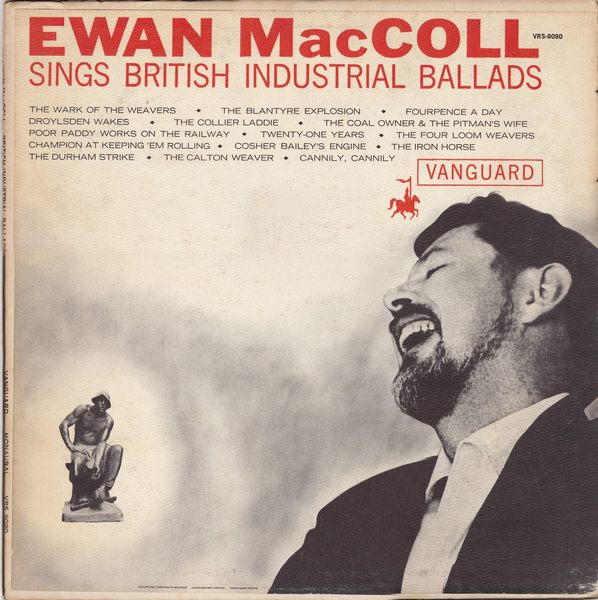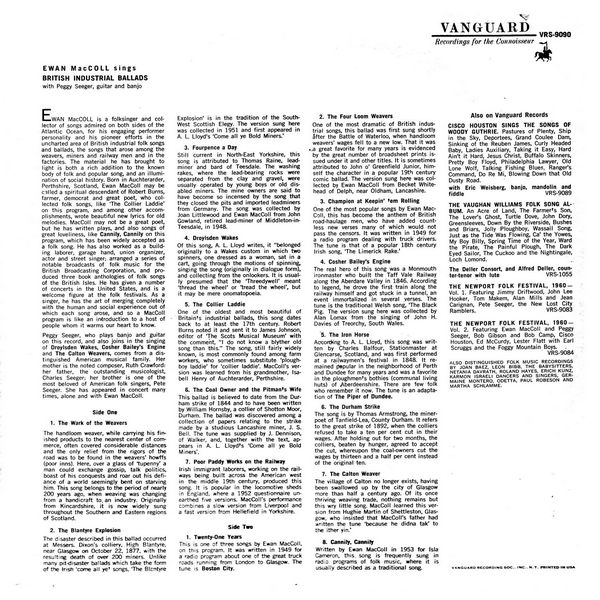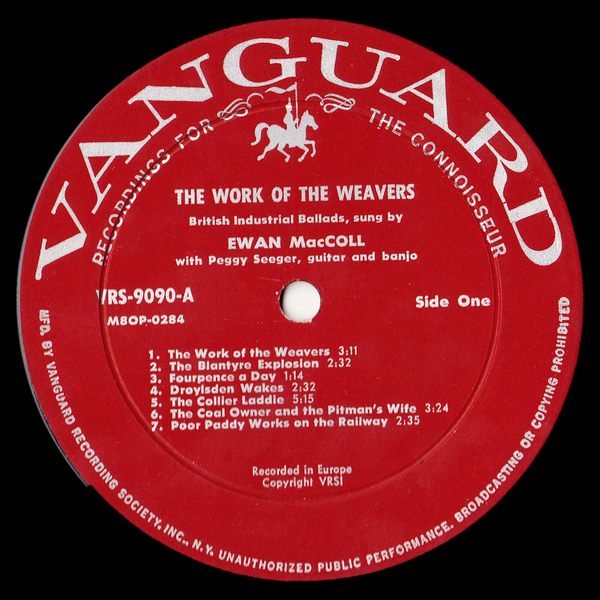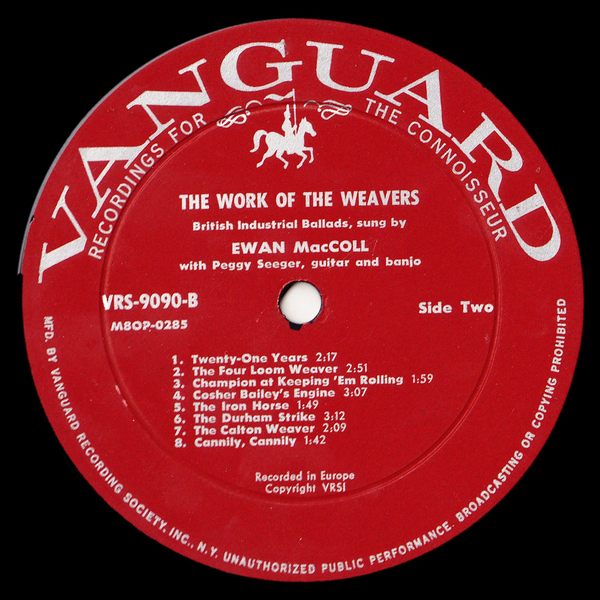

 |


 |
Sleeve Notes
EWAN MacCOLL is a folksinger and collector of songs admired on both sides of the Atlantic Ocean, for his engaging performer personality and his pioneer efforts in the uncharted area of British industrial folk songs and ballads, the songs that arose among the weavers, miners and railway men and in the factories. The material he has brought to light is both a rich addition to the known body of folk and popular song, and an illumination of social history. Born in Auchterarder, Perthshire, Scotland, Ewan MacColl may be called a spiritual descendant of Robert Burns, farmer, democrat and great poet, who collected folk songs, like 'The Collier Laddie' on this program, and among other accomplishments, wrote beautiful new lyrics for old melodies. MacColl may not be a great poet, but he has written plays, and also songs of great loveliness, like Cannily, Cannily on this program, which has been widely accepted as a folk song. He has also worked as a building laborer, garage hand, union organizer, actor and street singer; arranged a series of notable broadcasts of folk music for the British Broadcasting Corporation, and produced three book anthologies of folk songs of the British Isles. He has given a number of concerts in the United States, and is a welcome figure at the folk festivals. As a singer, he has the art of merging completely with the human and social experience out of which each song arose, and so a MacColl program is like an introduction to a host of people whom it warms our heart to know.
Peggy Seeger, who plays banjo and guitar on this record, and also joins in the singing of Droylsden Wakes, Cosher Bailey's Engine and The Calton Weavers, comes from a distinguished American musical family. Her mother is the noted composer, Ruth Crawford: her father, the outstanding musicologist, Charles Seeger; her brother is one of the most beloved of American folk singers, Pete Seeger. She has appeared in concert many times, alone and with Ewan MacColl.
The Wark of the Weavers
The handloom weaver, while carrying his finished products to the nearest center of commerce, often covered considerable distances and the only relief from the rigors of the road was to be found in the weavers' howffs (poor inns). Here, over a glass of 'tupenny' a man could exchange gossip, talk politics, boast of his conquests and roar out his defiance of a world seemingly bent on starving him. This song belongs to the period of nearly 200 years ago, when weaving was changing from a handicraft to an industry. Originally from Kincardshire, it is now widely sung throughout the Southern and Eastern regions of Scotland.
The Blantyre Explosion
The disaster described in this ballad occurred at Messers. Dixon's colliery, High Blantyre, near Glasgow on October 22, 1877, with the resulting death of over 200 miners. Unlike many pit-disaster ballads which take the form of the Irish "come all ye" songs, The Blantyre Explosion' is in the tradition of the South-West Scottish Elegy. The version sung here was collected in 1951 and first appeared in A. L, Lloyd's 'Come all ye Bold Miners.'
Fourpence a Day
Still current in North-East Yorkshire, this song is attributed to Thomas Raine, lead-miner and bard of Teesdale. The washing rakes, where the lead-bearing rocks were separated from the clay and gravel, were usually operated by young boys or old disabled miners. The mine owners are said to have become so incensed by the song that they closed the pits and imported leadminers from Germany. The song was collected by Joan Littlewood and Ewan MacColl from John Gowland, retired lead-miner of Middleton-in-Teesdale, in 1948.
Droylsden Wakes
Of this song, A. L. Lloyd writes, it "belonged originally to a Wakes custom in which two spinners, one dressed as a woman, sat in a cart, going through the motions of spinning, singing the song (originally in dialogue form), and collecting from the onlookers. It is usually presumed that the Threedywell' meant 'thread the wheel' or 'tread the wheel', but it may be mere onomatopoeia.
The Collier Laddie
One of the oldest and most beautiful of Britain's industrial ballads, this song dates back to at least the 17th century. Robert Burns noted it and sent it to James Johnson, editor of 'The Scots Musical Museum' with the comment, "I do not know a blyther old song than this." The song, still fairly widely known, is most commonly found among farm workers, who sometimes substitute 'plough-boy laddie' for 'collier laddie'. MacColl's version was learned from his grandmother, Isabel I Henry of Auchterarder, Perthshire.
The Coal Owner and the Pitman's Wife
This ballad is believed to date from the Durham strike of 1844 and to have been written by William Hornsby, a collier of Shotton Moor, Durham. The ballad was discovered among a collection of papers relating to the strike made by a studious Lancashire miner, J. S. Bell. The tune was supplied by J. Dennison, of Walker, and, together with the text, appears in A. L Lloyd's 'Come all ye Bold Miners'.
Poor Paddy Works on the Railway
Irish immigrant laborers, working on the railways being built across the American west in the middle 19th century, produced this song. It is popular in the locomotive sheds in England, where a 1952 questionnaire unearthed five versions. MacColl's performance combines a slow version from Liverpool and a fast version from Hellefield in Yorkshire.
Twenty-One Years
This is one of three songs by Ewan MacColl. on this program. It was written in 1949 for a radio program about one of the great truck roads running from London to Glasgow. The tune is Boston City.
The Four Loom Weavers
One of the most dramatic of British industrial songs, this ballad was first sung shortly after the Battle of Waterloo, when handloom weavers' wages fell to a new low. That it was a great favorite for many years is evidenced by the great number of broadsheet prints issued under it and other titles. It is sometimes attributed to John o' Greenfield Junior, himself the character in a popular 19th century comic ballad. The version sung here was collected by Ewan MacColl from Becket White-head of Delph, near Oldham, Lancashire.
Champion at Keepin' 'em Rolling
One of the most popular songs by Ewan MacColl, this has become the anthem of British road-haulage men, who have added countless new verses many of which would not pass the censors. It was written in 1949 for a radio program dealing with truck drivers. The tune is that of a popular 18th century Irish song, 'The Limerick Rake.'
Cosher Bailey's Engine
The real hero of this song was a Monmouth ironmaster who built the Taff Vale Railway along the Aberdare Valley in 1846. According to legend, he drove the first train along the railway himself and got stuck in a tunnel, an event immortalized in several verses. The tune is the traditional Welsh song, The Black Pig. The version sung here was collected by Alan Lomax from the singing of John H. Davies of Treorchy, South Wales.
The Iron Horse
According to A. L. Lloyd, this song was written by Charles Balfour, Stationmaster at Glencarse, Scotland, and was first performed at a railwaymen's festival in 1848. It remained popular in the neighborhood of Perth and Dundee for many years and was a favorite in the ploughmen's bothies (communal living huts) of Aberdeenshire. There are few folk who remember it now. The tune is an adaptation of The Piper of Dundee.
The Durham Strike
The song is by Thomas Armstrong, the miner-poet of Tanfield-Lea, County Durham. It refers to the great strike of 1892, when the colliers refused to take a ten per cent cut in their wages. After holding out for two months, the colliers, beaten by hunger, agreed to accept the cut, whereupon the coal-owners cut the wages by thirteen and a half per cent instead of the original ten.
The Calton Weaver
The village of Calton no longer exists, having been swallowed up by the city of Glasgow more than half a century ago. Of its once thriving weaving trade, nothing remains but this wry little song. MacColl learned this version from Hughie Martin of Shettleston, Glasgow, who insisted that MacColl's father had written the tune 'because he didna tak' to the ither yin.'
Cannily, Cannily
Written by Ewan MacColl in 1953 for Isla Cameron, this, song is frequently sung in radio programs of folk music, where it is usually described as a traditional song.